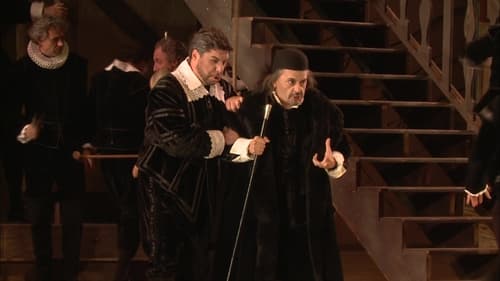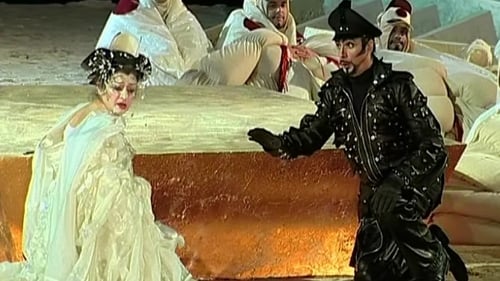
"This is a family tragedy, and in many ways, it is a very contemporary story." This is how Robert Wilson described Il trovatore, or Le Trouvère in its French version, commissioned from Verdi after the incredible success of the premiere of his Italian version in 1853. With a few changes and alterations to the original music, this version was first performed in 1857 at the Paris Opera. A light show unique to the stage director unfolds in the cold architecture, creating the perfect framing for Verdi’s music, dramatic and dark in this timeless opera.

Pang
Rebeka Lokar is a "commanding Turandot" (Bachtrack) and Jorge de Leon as the Priness' suitor a "true giant" (Corriere delle Sera) with his perfect rendition of "Nessun dorma". Grammy Award nominee Gianandrea Noseda impressively conducts the Orchestra and Chorus of the Teatro Regio "as modern as you have rarely experienced it. Chapeau! (Operalounge) Stage director Stefano Poda dedicates himself to bring Puccini's Ancient Chinese setting to life. To achieve an aesthetic and conceptual unity, his work also emcompasses setand costume design as well as lighting and choreography. "Extraordinary Turandot" (La Republica). "Unanimous applause at the end!" (La Stampa). "The icy Turandot inflames the Teatro Regio! (Coriere della Sera)

AN "INCREDIBLE"
Andrea Chénier is a verismo opera in four acts by Umberto Giordano, set to an Italian libretto by Luigi Illica, and first performed on 28 March 1896 at La Scala, Milan. The story is based loosely on the life of the French poet André Chénier (1762–1794), who was executed during the French Revolution.

Dottor Cajus
This 2013 Salzburg Festival performance of Falstaff, Giuseppe Verdis late masterwork and crowning achievement, features conductor Zubin Mehta and the Vienna Philharmonic. The staging thought up by Italian director Damiano Michieletto moves the action from a fictitious London to that special care home, the Casa Verdi, a place rich in memories of great days past and impressions of a real-time present. Ambrogio Maestri seems a tailor-made Falstaff. His physique is just right for the part, as are his powerful voice, flair for drama and feeling for the Verdi style. (New York Times)

Dr Caius
Part of Tutto Verdi series - Falstaff (2011) Parma. 'Falstaff' is an opera in three acts by the Italian composer Giuseppe Verdi (1813–1901). The libretto was adapted by Arrigo Boito from Shakespeare's 'The Merry Wives of Windsor' and scenes from 'Henry IV, parts 1 and 2'. The work premiered on 9 February 1893 at La Scala, Milan

Abbé de Chazeuil
In the present stylised production by Lorenzo Mariani the 'violet-perfumed murderess' is taken by mezzo-soprano Marianne Cornetti, one of the most in-demand representatives of her vocal category. Opposite her, in the role of Adriana, is a soprano who as a Verdi and verismo specialist also appears regularly at all the major international opera houses, Micaela Carosi. The 'cock-of-the-walk' role is sung by the world-class tenor Marcelo Álvarez. His timbre, velvety smooth yet robustly virile, is ideally suited to a vocal characterisation of the idolised Maurizio. Conductor Renato Palumbo is very much at home with Cilea's operatic masterpiece, since the Italian Romantic and verismo periods are at the core of his extensive repertoire.

Andrés / Cochenille / Pitichinaccio / Frantz
Live peformance from the Sferisterio Opera Festival, August 2004. Our edition has an Italian cast of exceptional quality, in which stand out the amazing voice of Desirée Rancatore, the extraordinary artistry of Ruggiero Raimondi and the fascinating direction of Pier Luigi Pizzi, one of today's most creative directors. Interesting overview here: http://www.operatoday.com/content/2006/08/offenbach_les_c.php

Goro
Japan, early twentieth century. U.S. Navy Lieutenant B.F. Pinkerton inspects the house he has leased from a marriage broker. The broker, Goro, has procured him three servants and a geisha wife, Cio-Cio-San, known as Madama Butterfly. He is enchanted with the fragile Cio-Cio-San. Cio-Cio-San is heard in the distance joyously singing of her wedding. In a quiet moment, Cio-Cio-San shows her bridegroom her few earthly treasures and tells him of her intention to embrace his Christian faith. The Imperial Commissioner performs the wedding ceremony, and the guests toast the couple. The celebration is interrupted by Cio-Cio-San's uncle, a Buddhist priest, who bursts in, cursing the girl for having renounced her ancestors' religion. Alone with Cio-Cio-San in the moonlit garden, her husband dries her tears, and she joins him in singing of their love.

Giuseppe, Violetta's servant
Violetta, a courtesan much wooed by Parisian society, organizes a grand party that is attended, amongst others, by the young Alfredo Germont. He confesses his feelings to Violetta, who is already suffering from consumption. She vacillates between genuine affection and a realistic assessment of her situation as a "fallen woman", which precludes any lasting relationship with a man. The Franco Zeffirelli production of LA TRAVIATA, recorded live at the Teatro Giuseppe Verdi, Februari 2002.








